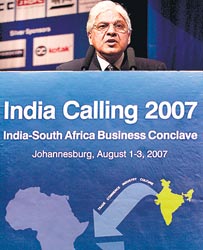
India on African safari, hunting oilMahatma Gandhi once said that "commerce between India and Africa will be of ideas and services, not of manufactured goods against raw materials after the fashion of western exploiters." However, according to Zambian opposition MP Guy Scott, "People are saying, 'The Whites were bad, the Indians were worse, but the Chinese are worst of all.' " By Alex Vines and Gareth Price China's increasing influence in Africa has attracted great attention in recent years. But Asia's other rising power, India, is also becoming more active on this front, as its economic links are moving beyond its traditional partners in the British Commonwealth. Indeed, India's non-oil trade with West Africa currently stands at more than $3 billion and is rising fast, accounting for 1.2% of the country's total foreign trade. India's economic activity in Africa goes far beyond its ever popular Bollywood movies. Indian investment in Côte d'Ivoire is expected to grow to $1 billion by 2011, which represents 10% of total Indian foreign investment in the last decade. India's state-run Oil and Natural Gas Corporation (ONGC Videsh) produces Sudanese oil, and over the next two years Indian diplomatic missions will open in Mali, Gabon, Niger, and Burkina Faso. Until 2003, the Indian Foreign Ministry had a single Africa division; it now has three: West and Central Africa, East and Southern Africa, and West Asia and North Africa.
A study by the Federation of Indian Chambers of Commerce and Industry identified five main sectors that can act as "engines of growth" to boost Indo-Africa trade: pharmaceuticals and the health sector, information technology, water management, food processing, and education. Nigeria is India's largest trading partner in Africa. Bilateral annual trade turnover exceeds $3 billion, with oil constituting more than 96% of Indian imports from Nigeria. India maintains a three-pronged strategy: term contract for crude purchase, participation in the upstream sector, and refineries. This puts India in direct competition with the West and other Asian countries to secure West African resources. But India's quest for energy in West Africa is not a core component of the government's energy policy; rather, it is part of its effort to diversify energy sources by offering infrastructure investments, in addition to cash bonus payments when contracts are signed. Seventeen of the 45 blocks are being reserved for unknown companies that will be given a first right of refusal on acreage in exchange for promises to invest heavily in projects not directly related to oil production, such as new power plants and refineries. These negotiations have been ongoing, and India's ONGC, in alliance with Mittal Energy, part of the Mittal companies run by Indian billionaire Lakshmi Mittal, is tipped to get the right of first refusal for a number of blocks. During a Nigerian mini-bid round in 2006, ONGC-Mittal was offered the right of first refusal for three blocks. ONGC-Mittal Energy is keen to secure blocks with proven reserves, but also is less concerned about the fine detail of the infrastructure packages than their Asian competitors. The creation of ONGC-Mittal in late 2005 seems to have been intended to cut through bureaucratic processes, learn from the private sector, and strengthen bids as an infrastructure provider. In 2005, the Indian Cabinet's Committee on Economic Affairs prevented, on due diligence grounds and at the last moment, the overseas arm of ONGC Videsh from entering into a $2 billion deal for a stake in a Nigerian oil block. But the 2007 licensing round appears to have been rushed through to raise cash during the dying days of the Obasanjo administration, and it would serve India's government well to watch this process closely, too. Other parts of the Mittal dynasty have also raised eyebrows in West Africa. In late 2005, Mittal Steel, the world's largest steel company, signed a $900 million deal with Liberia's Transitional Government to mine iron ore, which many claim allowed Mittal to opt out of human rights and environmental law. The elected government of President Ellen Johnson-Sirleaf in 2006 reviewed the deal, and the Liberian Senate is currently scrutinizing it. India's business engagement in Africa attracts mixed opinion. Mahatma Gandhi once said that "commerce between India and Africa will be of ideas and services, not of manufactured goods against raw materials after the fashion of western exploiters." However, according to Zambian opposition MP Guy Scott, "People are saying, 'The Whites were bad, the Indians were worse, but the Chinese are worst of all.'" India should not regard Africa as simply a source of natural resources. Instead, it needs to invest in the region's human capital and share Indian know-how. Many Indian goods have much greater suitability for African than Western markets. Sales of Tata cars, for instance, are booming in many African countries. But shared know-how should move beyond economic links. India's democracy in a post-colonial setting has relevant lessons for Africa. India also offers important experience in agricultural expansion, clean water management, and confronting the growing threat of climate change. Whatever role India ultimately plays in Africa, perhaps its most important contribution could be to introduce competition. India's government needs to carefully watch how its companies and others rise to this challenge. (Alex Vines and Gareth Price are, respectively, head of the Africa and Asia programs at Chatham House, the Royal Institute of International Affairs, in London.) Copyright: Project Syndicate, 2007. Exclusive to The Sunday Times |
|| Front
Page | News | Editorial | Columns | Sports | Plus | Financial
Times | International | Mirror | TV
Times | Funday
Times || |
| |
Copyright
2007 Wijeya
Newspapers Ltd.Colombo. Sri Lanka. |
